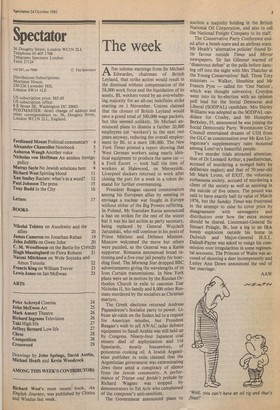The week
After solemn warnings from Sir Michael Edwardes, chairman of British Leyland, that strike action would result in the dismissal without compensation of the 58,000 work force and the liquidation of its assets, BL workers voted by an overwhelming majority for an all-out indefinite strike starting on 1 November. Unions claimed that the closure of British Leyland would save a grand total of 500,000 wage packets, but this seemed unlikely. Sir Michael announced plans to dismiss a further 20,000 employees (or 'workers') in the next two years anyway, reducing the overall employment by BL to a mere 100,000. The New York Times printed a report showing that West German workers using nearly identical equipment to produce the same car — a Ford Escort — took half the time of workers at Halewood, on Merseyside. Liverpool dockers returned to work after closing the port for a week in a token demand for further overmanning.
President Reagan caused consternation among his European allies by seeming to envisage a nuclear war fought in Europe without either of the Big Powers suffering. In Poland, Mr Stanislaw Kania announced a ban on strikes for the rest of the winter but it was his last action as party secretary, being replaced by General Wojciech Jaruzelski, who will continue in his posts of Prime Minister and Defence Minister. Moscow welcomed the move but others were puzzled, as the General was a Kania supporter. Romania announced bread rationing and a five-year jail penalty for hoarding food. The Morning Star dropped BBC advertisements giving the wavelengths of its Iron Curtain transmissions. In New York plans were set in motion by the Russian Orthodox Church in exile to canonise Tsar Nicholas II, his family and 8,000 other Russians murdered by the socialists as Christian martyrs.
The Greek elections returned Andreas Papandreou's Socialist party to power. Libyan air-raids on the Sudan led to a request for American missiles, but President Reagan's wish to sell AWAC radar defence equipment to Saudi Arabia was still held up by Congress. Ninety-four Japanese coal miners died of asphyxiation and 116 Spaniards, mostly housewives, of poisonous cooking oil. A Jewish Argentinian publisher in exile claimed that the Argentinian government was exterminating Jews there amid a conspiracy of silence from the Jewish community. A performance of Tristan und Isolde's prelude by Richard Wagner was stopped by demonstrators in Tel Aviv who complained of the composer's anti-semitism. The Government announced plans to auction a majority holding in the British National Oil Corporation, and also to sell. the National Freight Company to its staff.
The Conservative Party Conference ended after a bomb scare and an anthrax scare.
Mr Heath's 'alternative policies' found lit tle favour outside Times and Mirror newspapers. Sir Ian Gilmour warned of 'disastrous defeat' at the polls before danc ing off into the night with Mrs Thatcher at the Young Conservatives' Ball. Three Tory ministers — Walker, Heseltine and Mr Francis Pym — called for 'One Nation', which was thought subversive. Croydon went into its by-election with an opinion poll lead for the Social Democrat and Liberal (SODPAL) candidate. Mrs Shirley Williams was adopted as the SODPAL can didate for Crosby, and Mr Humphry Berkeley, 55, announced he was joining the Social Democratic Party. Westminster City Council entertained dreams of UDI from the GLC as consternation over Mr Ken Livingstone's supplementary rates mounted among London's beautiful people.
Two murder trials attracted attention: that of Dr Leonard Arthur, a paediatrician, accused of murdering a mongol baby by deliberate neglect; and that of 70-year-old Mr Mark Lyons, of EXIT, the voluntary euthanasia society, accused of murdering a client of the society as well as assisting in the suicide of five others. The pound was said to have exactly half its value of March 1976, but the Sunday Times was frustrated in the attempt to raise its cover price by disagreement with newsagents and distributors over how the extra money should be shared. Lieutenant-General Sir Steuart Pringle, Bt, lost a leg in an IRA bomb explosion outside his home in Dulwich and Major-General H.S.L.
Dalzell-Payne was asked to resign his com mission over irregularities in some regimental accounts. The Princess of Wales was ac cused of shooting a deer incompetently and Lesley Ann Down announced the end of her marriage.
AAW


































 Previous page
Previous page